
Arquivo para May, 2023
Controversies of spiritual and philosophical asceticism
To deny asceticism, one resorts to the idea that it would be impregnated with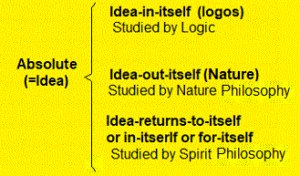 “Christian exegesis”, however, the literature itself shows that this is a contradiction, since both idealist philosophy tries to remake a vision of what is spiritual in the “Phenomenology of the Spirit” and also more modernly Foucault ( ) will say that the Greeks in the Hellenistic and Roman times would be far from understanding the term we call ascesis. “Our notion of asceticism is, in fact, more or less modeled and impregnated by the Christian conception”. (FOUCAULT, 2004, p.399).
“Christian exegesis”, however, the literature itself shows that this is a contradiction, since both idealist philosophy tries to remake a vision of what is spiritual in the “Phenomenology of the Spirit” and also more modernly Foucault ( ) will say that the Greeks in the Hellenistic and Roman times would be far from understanding the term we call ascesis. “Our notion of asceticism is, in fact, more or less modeled and impregnated by the Christian conception”. (FOUCAULT, 2004, p.399).
In Michel Inwood’s Hegelian dictionary, we find the concept of Spirit (geist): “Geist includes the most intellectual aspects of the psyche, from intuition to thought and will, but excluding and contrasting with the soul, feeling, etc.”, however Spirit in Hegelian usage has a meaning that is both similar and different from that used in everyday life (in the sense of the soul) and in philosophy, since there is also a “Trinitarian” meaning there.
As in all idealist philosophy, Hegel is a post-Kantian it is good to say, there is a search for overcoming the subject and object duality, for Hegel it is found in the Absolute Spirit, said in such a way as to propitiate an encounter between the subject and the object, forming an identity that takes place within the mutual relationship between subjectivity and objectivity.
While in Kant transcendence is what makes the Subject go to the object, in Hegel it is the Absolute that marks a meeting between the subject and the object, forming an identity that takes place within the mutual relationship between subjectivity and objectivity, but in both there is no Being in transcendence.
It is important to understand this relationship because in it what Hegel treats as an essential intellectual activity takes place, for the intellective apprehension both about the object (which is precisely the moment of alienation as a “going out of the Self”) and about the subject itself (the return to subjectivity after the experience with the object, that is, the Other as he sees it), thus different from the ontology of Husserl, Heidegger and others, who see in this an ontological relationship with Being.
For this, one must penetrate the Hegelian categories: in-itself, of-itself and for-itself, said in the Philosophy of Right as: “In effect, the in-itself is consciousness, but it is also that for which it is a Other (the in-itself): it is for consciousness that the object’s in-itself and its being-for-an-other are the same. The I is the content of the relationship and the relationship itself; it confronts an Other and at the same time surpasses it; and this Other, for him, is only himself” (HEGEL, 2003);
Many contemporary philosophers will see the Other, as something beyond the Self, and a for-itself something beyond the Self and the Other, a “for” beyond.
Although there are controversies both in Hegelian idealism and in his “Trinitarian” dialectical conception, it is important to note that for him the members of a community should always have among the principles the one that “has objectivity, truth and morality” (HEGEL, 2003, §258).
Foucault, Michel. (2004) A hermenêutica do sujeito. Transl. Márcio Alves da Fonseca; Salma Tannus Muchail. Brazil, São Paulo: Martins Fontes.
Hegel, G.W.F. (2003) Princípios da Filosofia do Direito. Transl. Orlando Vitorino. Brazil, São Paulo: Martins Fontes.
Inwood, M. J. (1997) Hegel. Dicionário Hegel. Transl. Álvaro Cabral. Brazil, Rio de Janeiro: Jorge Zahar Editor.
Asceticism as human and spiritual elevation
It is not specific to a religion and is also defined in philosophy, from the Greek áskesis, “spiritual exercise”, derived from ἀσκέω, “to exercise”, consisting of a practice or more practices that promote spiritual development, the simple idea of renouncing pleasure or the primary needs, must be seen within certain contexts or periods, therefore it is not normal in general and also its opposite does not mean just sinning, but deteriorating, weakening when failing to do certain exercises.
Greek áskesis, “spiritual exercise”, derived from ἀσκέω, “to exercise”, consisting of a practice or more practices that promote spiritual development, the simple idea of renouncing pleasure or the primary needs, must be seen within certain contexts or periods, therefore it is not normal in general and also its opposite does not mean just sinning, but deteriorating, weakening when failing to do certain exercises.
Peter Sloterdijk, an agnostic, speaks of this despiritualized asceticism, in the sense that we are a society of exercises, but that they do not provide either a human or spiritual elevation, a clear example of this is the number of academies that grow in the country and in many places of the world. world, another example is the demonstrations of virility as a human elevation, of course it is important to take care of health, but sometimes excessive exercise and medication do the opposite.
From the human point of view, what we experience is a decadence that goes from the moral to the religious, subjects so clear until recently, today they are seen as having almost absurd controversies to the point of the immoral being considered “normal” and “human” and the religious being identified with atrocities.
The series of humanitarian crises could not fail to affect the economy, these are not simple market crises, they are at the epicenter of wars and economic fallacies, it is not necessary to be an economist to see that simplistic formulas do not work at either extreme: the wild capitalism and socialism without freedom and without human quality.
It seems difficult to recognize what a true spirituality would be then, even with the principle of asceticism, which means human elevation in social relations and in the inherent dignity of every human being, in respect for nature and in the preservation of its benefits, in short, in the love of life .
Even for the concept of peace we go back in history, the pax Roman seems to be the principle for many wars, whatever the one that subdued “enemy” territories to declare peace, not even the eternal peace of contemporary idealism is claimed, although it also have limitations.
It is a harbinger of great tragedies, including war, what is hoped is that somehow forces that still have a human and spiritual background can interpose this contemporary reality and revert the dangerous situation that we all face and few work for its reversal (photo about Pulitzer Prize in 2023).
Visit to Rome, Counteroffensive and Pulitzer Prize
The week was all about Ukraine: a visit to Rome and the pope, advances in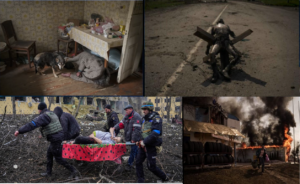 Backhmut and photos from the war that drew attention when they won the Pulitzer Prize, the photos are shocking and perhaps say more than words, since today there is even incomprehensible rhetoric favor of war.
Backhmut and photos from the war that drew attention when they won the Pulitzer Prize, the photos are shocking and perhaps say more than words, since today there is even incomprehensible rhetoric favor of war.
In the strategic plan, there is no Portuguese analyst Germano Almeida pointed out: “here in the West we are not yet aware of the plans, so there is a Ukrainian idea that this is just the beginning and nobody knows where in fact this counter-offensive can be launched because the Bakhmut’s question could be a first diversion maneuver [discussion] and the essential thing and the mass offensive could be elsewhere”, says Almeida.
The visit to Italy, in addition to the country’s already declared support, the visits to Italian President Sérgio Mattarela and with Prime Minister Giorgia Meloni, he also participated in a talk show on Italian TV, about the pope, all that is known is an agreement humanitarian assistance to refugees.
The images that won the prize also have a Brazilian on the list: Felipe Dana, from Rio de Janeiro, who filmed and photographed scenes from Bucha, the most cruel and violent massacre carried out by Russia in Ukraine (first photo below), it is worth remembering that the war was also from Vietnam had awards on the horrors there.
Some images from the 2023 Pulitzer Prize given to several Associated Press photographers, including the Brazilian, if words don´t move, maybe the images will.
The Other, the Infinite and the Truth
The development of the question of Being in modern philosophy is not separated from the religious question, Gadamer recalls the example of the gods in works of art from the Greek world (Gadamer, 1997, p. 18),
from the religious question, Gadamer recalls the example of the gods in works of art from the Greek world (Gadamer, 1997, p. 18),
The other is treated in different areas of ontology, becoming almost an essential category.
Another important point on the path to Truth, states that it is necessary to recognize: “The finitude of understanding itself is the way in which and where reality, resistance, the absurd, and incomprehensible reaches validity.” (Gadamer, 1997, p.24), and expands this history to the historical one, where he criticizes Dilthey’s romantic historicism and emphasizes that it is not ahistorical.
Thus, the path (or the method) to the Truth is traced the development of the hermeneutic circle as a new and revolutionary method for the Truth, listening to the text (or the Other) and performing a fusion of horizons, where it is possible to see and rethink more clearly the Truth.
The simple elaboration of narratives that justify the power of certain truths is nothing more than a return to the obscurity and opportunism of the modern sophist discourse, now using as a resource the limits and specialties of certain sciences, for example, law and economics that seen in their restricted fields are nothing but sophisms that justify each other.
When analyzing the possibility of the end of metaphysics, Gadamer points out: “If science rises to total technocracy, and thereby covers the sky with the “night of the world” of “forgetfulness of being”, the nihilism predicted by Nietzsche, may if then you keep looking behind the last glint of the sun that went down […]” (GADAMER, 1997, p.27), that is, science is not part of this question.
A true humanism must look to the infinite, not just the one that is now visible through the James Webb megatelescope (which raises many questions as well), it cannot fail to ignore the infinite, the mystery and the religious phenomenon.
For Christians, this truth was revealed humanly and visibly in Jesus, last week we remember the disciples saying “Show us the Father” (Jn 14:8), now on another front Jesus reveals himself more fully to those who follow him (Jn 14:8). 14, 16-17): “And I will pray the Father, and he will give you another Advocate, that he may abide with you always: the Spirit of Truth, which the world is not able to receive, because it neither sees him nor knows him” .
This is not an arrogant Truth, it can and must dialogue with the cultures of our time.
Gadamer, H.G. (1997) Verdade e método. Transl. Flávio Paulo Meurer. Brazil: Petrópolis, RJ: ed. Vozes.
The fundamental question of the method
The historical question could not be missing, in fact before the book “The truth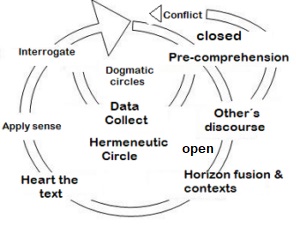 and method”, it was a lecture by Gadamer that started this work, called “The question of historical conscience”, the book was corrected and translated into English after publication of the masterpiece, and from this version came the Portuguese version.
and method”, it was a lecture by Gadamer that started this work, called “The question of historical conscience”, the book was corrected and translated into English after publication of the masterpiece, and from this version came the Portuguese version.
Thus the author states: “Because, only with the failure of the naive historicism of the historical century, it becomes evident that the opposition that exists between a-historical-dogmatic and historical, between tradition and historical science, between ancient and modern, is not absolute.” (GADAMER, 1997, p.22).
So it is in the face of this finitude of knowledge that one must depart: “The finitude of understanding itself is the way in which and where reality, resistance, the absurd, and the incomprehensible reaches validity. Anyone who takes this finitude seriously must also take the reality of history seriously” (Gadamer, 1997, p.24), and from there he resumes and reorganizes the hermeneutic circle.
Thus, what he calls effectual history starts from the understanding of “what makes the experience of you so decisive for all self-understanding” (idem), it will be from there that he will elaborate his philosophical hermeneutics, which seems paradoxical, he states: “precisely Heidegger’s critique to transcendental questioning and his thought of the “turn” (Kehre) serves as a basis for the development of the universal hermeneutic problem, which I undertake” (Gadamer, 1997, p.25), and thus for him “language does not arise in the consciousness of those who speaks” and has nothing to do with subjectivity, since the subject’s experience has nothing “mystical” or “mystifying”.
He clarifies that his methodology goes beyond a purely metaphysical view, and says about the method of idealism: “I think that Kant’s Critique of Pure Reason is binding, and that propositions that do nothing more than add, by thought, and dialectically, the infinite to the finite, the being in itself to what is humanly experienced, the eternal to the temporal, I consider them as mere extreme determinations, from which, by the strength of philosophy, no knowledge of our own will be able to develop. (GADAMER, 1997, p.26).
With regard to metaphysics, he clarifies that even the Hegelian tradition, which does not abandon the idea of infinity, has: “the tradition of metaphysics and especially its last great formulation, Hegel’s speculative dialectic, contains a constant proximity.” (idem).
And he resumes Heidegger’s question of the oblivion of being: “What does the end of metaphysics mean, as a science? What does it mean to finish in science? If science rises to total technocracy, and thereby covers the sky with the “night of the world” of the “oblivion of being”, the nihilism predicted by Nietzsche, then one can look behind the last glint of the sun that has set […]” (GADAMER, 1997, p.27).
The opening to the Other opens up a perspective of merging the horizons of the Being, which applies a new meaning to the text (or discourse) and allows one to question oneself about the truth and reach it, this is the hermeneutic circle.
Gadamer, H.G. (1997) Verdade e método. Transl. Flávio Paulo Meurer. Brazil: Petrópolis, RJ: ed. Vozes.
Truth and Hermeneutics
It was Hans-Georg Gadamer who developed and founded a deeper criterion for 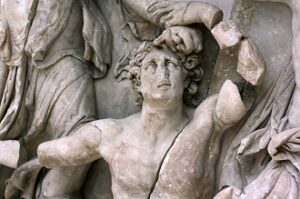 making a correct interpretation of method and truth (the name of his two-volume book) in the human sciences, and it is not about opposing the natural sciences, but giving the sciences social a soul and a “spirit”, even the one understood strictly in non-religious thought, but that actually seeks the truth and not the syllogism, pure logic or even sophistry.
making a correct interpretation of method and truth (the name of his two-volume book) in the human sciences, and it is not about opposing the natural sciences, but giving the sciences social a soul and a “spirit”, even the one understood strictly in non-religious thought, but that actually seeks the truth and not the syllogism, pure logic or even sophistry.
Gadamer clarifies right at the beginning of his masterpiece: “The fact that I used the expression “hermeneutics”, weighing an old tradition on my shoulders, certainly led to misunderstandings” (GADAMER, 1997, p. 14) .
Returning to the question of the natural sciences, the author clarifies the misunderstanding “the famous Kantian distinction between the questionio juries and the questionio facti” (Gadamer, 1997, . 16), it was not a question of a court of reason, but “.It posed a philosophical question, that is, he asked about the conditions of our knowledge, through which modern science becomes possible, and what is the scope of science” (idem).
Thus his philosophical behavior in response to the question: “what is knowledge” was developing the temporal analysis of existence: “which Heidegger developed, I think, convincingly showed that understanding is not a way of being, among other modes of behavior of the subject, but the way of being of the pre-sence itself (Dasein)” (ibidem).
Before entering the question of history, he seeks its origins by stating: “However, where is the world and the afterworld really separated? How does the vital significance of the originary pass into the reflective experience of the significance of formation?” (GADAMER, 1997, p. 17).
Humanism had not been separated from the religious phenomenon: “One should recognize and admit that an ancient image of gods, for example, which was not represented in the temple as a work of art for the aesthetic enjoyment of reflection, and which today has its representation in the modern museum, contains within itself the universe of religious experience.” (GADAMER, 1997, p. 18).
Thus, before reflecting on history, Gadamer will reflect on art, and does not fall into the dualism of subjectivism, he exposes his conviction that: “Thus, no one will convince me, objecting to me that the reproduction of a musical work of art is interpretation in a different sense than, for example, the achievement of understanding in reading poetry or looking at an image.” (GADAMER, 1997, p. 19).
The artistic experience in its “method” and “truth” is not exclusive, but it is the one that allows greater breadth in its conception of what really leads us to the “method” that guides the “truth”.
Gadamer, H.G. (1997) Verdade e método. transl. Flávio Paulo Meurer. Brazil: Petrópolis, RJ: ed. Vozes.
Arete’s Absence
The Greek virtues and educational formation, through paideia referred to the total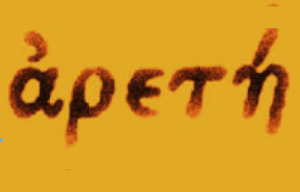 formation of the Greek man, so Areté was this peak (translated as ideal, however the modern ideal refers more to the subjective x objective dualism than to the Greek Eidos, which is more linked to having a vision, showing reality).
formation of the Greek man, so Areté was this peak (translated as ideal, however the modern ideal refers more to the subjective x objective dualism than to the Greek Eidos, which is more linked to having a vision, showing reality).
Thus, the total vision (for the time, but less segmented than today), indicated a man who was a citizen of the polis with virtual attributes (this is the true meaning, coming from virtus), which placed him in harmonious conjunction with the city-states and their statutes.
Both in culture, and mainly in politics today, these attributes are little lacking, it is more about building a narrative that justifies all brutal power over the citizen, so the laws are made in order to protect the oligarchy in power, it is It is also true that in Greek times those who were citizens were limited to free men (there were slaves) only.
The worsening of bipolarization, where coexistence is not possible, has a dangerous aspect for exclusivist authoritarianisms where a part of society must be segregated.
The areté is missing, so it is impossible to think of statesmen, leaders who think of society as a whole, because their culture and concepts are based on that part they belong to and claim that their model is universal, thus justifying their barbarism.
Already in the reading of the historical books “Ilíada” and “Odisséia” we register this ideal of areté as strength, dexterity and heroism of the warriors, qualities that were uncommon to the men of that time, so it is a fact that in the origin they also served the purpose of the war.
However, a modern areté that would lead us to honesty, to the spirit of dialogue, not the hypocrisy of talking only with those who suit us, could lead us to a new civilizing eidos.
A culture that does not ignore history and what is good and lessons learned through it, a vision of the polis that goes beyond partisan selfishness and the game of interests, a policy that could “see”.
Worldly blindness leads the civilizing process more and more to collapse, barbarism and hatred.
Only a modern areté that leads men to a culture of peace will revert the civilizing process to the common good.
War and our dayli bread
As one of the largest grain producers, Ukraine at war would certainly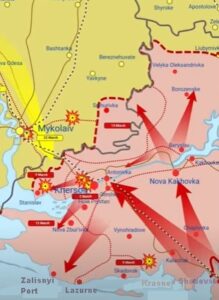 affect the market, and it took a while but it happened, the Chicago Stock Exchange recorded an advance in the price of wheat last week, and soon it will reach the market and our daily bread.
affect the market, and it took a while but it happened, the Chicago Stock Exchange recorded an advance in the price of wheat last week, and soon it will reach the market and our daily bread.
A product on the rise can drag down other products (such as corn, for example), the more advanced countries seemed to already know this and took preventive measures: China, Russia and the USA have already been reinforcing stocks and taking protective measures, in our if we trust agribusiness, but we cannot forget that we are part of a global trade.
And if the war were to end, we drew a picture last week of the Ukrainian counter-offensive and the Russian expectation, which expects a new offensive in the North, as it was in the resumption of Kharkiv last year, but now it seems that the scenario will be different.
The war has grown into technology, Russia has frequently blocked US-made mobile rockets in Ukraine (according to CNN), while Ukraine has intercepted Russia’s sophisticated hypersonic missile (according to Brazilian site G1).
In the North, where the new republics of Donesk are located, according to analyst Niklas Masuhr of the Center for Security Studies at the Federal Polytechnic School of Zurich, Russia has erected trenches in the region, to avoid Ukrainian actions that are always unlikely and change places easily for they know the land (on uol site).
But attacks can happen to the south, despite being small villages around Odessa, such as Lazurne (3,800 inhabitants), Zalizniy Port (1,500 inhabitants) and Krasne (1,300) beach towns and strategic city Zapozhshya.
The Ukrainian tactic has always been to surprise the Russian army and change strategy where it finds less resistance, a good part of the Russian army was withdrawn from the Crimea which is close to this region via the Black Sea, the grain trade is already looking at this scenario.
The week that begins will determine the strategy and tactics of each side, unfortunately the war continues and the damage to all humanity will begin to reach everyone’s table, and the poorest in particular.
Understand, see and believe
Not being able to have a category for itself that contemplates the Whole,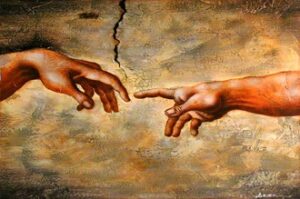 beyond the universe and its mysteries, the Being that precedes everything and everyone, Hegel’s category for itself returns to be the one that Sartre sees with the return to being- purely human in itself and finds nothingness instead of everything.
beyond the universe and its mysteries, the Being that precedes everything and everyone, Hegel’s category for itself returns to be the one that Sartre sees with the return to being- purely human in itself and finds nothingness instead of everything.
Yes, it is a mystery, how the universe itself reveals itself, even penetrating the depths of our Being we will only find both the being-in-itself revealed as designo (in the sense of divine designer) if we truly find the for-itself, and in this case as there is an infinite mystery, it is necessary to believe.
But it is not a blind belief, or pure fanaticism, not even an act of elevated altruism, it must be an encounter with our own Being, there we sit in a comfortable armchair and understand that we were born to build, grow and love, without these premises , the opposite will be dangerous and when taken to the whole society, hatred, intolerance and in the end: war prevails.
It is not the threat of a divine Being who created us for perfection, it is the threat of those who deny more than the need for a supreme Being and Knowledge (Plato called it the Supreme Good), which cannot be realized except in the fullness of a pure Being that is Being-in, Being-for-Itself and being-from-above that humanity becomes.
Hegel came close to a trinitarian concept, but idealism prevented him, since there is an intrinsic dualism in him, which divides objectivity (of being-in-itself) from subjectivity (of being-for-itself).
This difficulty was striking in Thomas who wanted to see and touch the marks on the body of the Risen Jesus, also in another passage (a little forgotten) Philip asks Jesus to “show the father”*, to which Jesus replies: whoever sees me, sees the Father .
The historical Jesus cannot be denied, he is not a myth, nor a symbolic fact, there was a man in himself, a God-for-himself and a man/God-of-himself in relation to humanity.
* The specific passage of the Bible is in John 14, 8-9: Philip said: “Lord, show us the Father, that is enough for us!” Jesus answered: “Have I been with you so long, and you don’t know me, Philip? Anyone who has seen me has seen the Father.”
The question of the consciousness of Being
Thanks to the new and surprising advancement of deep intelligence machines (deep learning), the issue of consciousness, which was already thought of in philosophy, now spreads across all areas of thought, and what we dealt with in previous posts also dealt with this.
(deep learning), the issue of consciousness, which was already thought of in philosophy, now spreads across all areas of thought, and what we dealt with in previous posts also dealt with this.
Now it is a matter of deciding whether it is possible to think of consciousness only as something logical and instrumental, so the machine, through deep and elaborate algorithms in dialogue with humans, could reach this level, if something beyond, which we reformulate in the category for-itself, then we have to think of a consciousness of the universe and it cannot be a thing, but a Being.
Why is there something and not nothing is a question raised since Leibniz, who solves it through the monad, and God is (would be) the “Monad of monads” (the phrase is from Hegel, sic!), then the universe was putting into movement, then in a quantum space-time, the Big Bang, and now the James Webb telescope captures an image that would be of a possible origin of the universe, with many galaxies, something is wrong.
In an article published in the journal Nature on February 22, “A population of red candidate massive galaxies 600 Myr after the Big Bang” (Labbé et al.) (Myr, millions of light years) indicates that close to the big bang there would already be massive galaxies and not the first formations of nebulae, for example (see our post), so could it be that there was already a universe in formation from the beginning?
Regardless of this, the question remains: who what or what mystery sent the beginning of everything.
Just as one cannot speak of ethics without metaphysics, it is not something substantial but spiritual, one cannot speak of consciousness only as something natural, based on experience.
Starting from Husserlian phenomenology, his disciple Heidegger elaborated consciousness as follows: the phenomenology (experience) of consciousness is not a path that lies before natural consciousness and leads it towards the absolute, like an itinerarium mentis in deum (Heidegger, 2007 , p. 169), rather it is the course that the absolute itself follows on the way to the truth of its complete appearing. (Heidegger, 2007, p. 169)
But Heidegger continues as in any modern building, he has the question of knowledge as a pillar of natural consciousness, he does not admit a transcendent revealed consciousness (for-itself), thus being a knowledge that has not yet realized in itself the whole truth (Heidegger 2007 , p. 169).
So it is about denying the truth revealed as truth, although your consciousness remains linked to the Being (it is ontological as your thought), there is no possibility of a pure primordial Being, a Being-for-itself, omniscient and omnipotent, so we are left looking at the telescope image.
There is a transcendent for-itself that surrounds this question, and thus a consciousness that projects beyond even the beginning of the universe, and that at the same time is present in every being-in-itself.
Heidegger, Martin (2007). Hegel. Translation by Dina V. Picotti C. Buenos Aires: Prometeo Libros, 2007.
.

